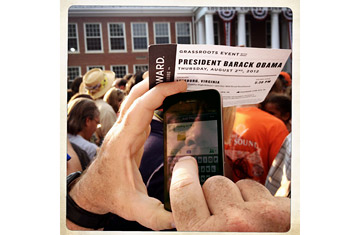
A supporter sends a photo on his mobile phone during a campaign rally for U.S. President Barack Obama at Loudoun County High School in Leesburg, Virginia.
Barack Obama's Arlington, Va., campaign office looks a lot like a kindergarten classroom, with walls decorated with butcher paper, tempera paint and colored marker. But on a recent Saturday morning, Ian Redman, a 19-year-old field organizer wearing Converse high-tops patterned after the American flag, sat there glimpsing the future of politics in his hand. "This is what is really cool," the Wisconsin native said to a handful of volunteers around him, who all looked down at their smart phones.
The volunteers tapped along on their individual screens, exploring deeper into the electioneering app that the Obama campaign released in August. Tap one button and there are forms to register voters, automatically tailored to the precinct that the phone and its user are in. Tap another and there is a way for donors to give money using the device. Tap a third and there are locally tailored factoids, Twitter messages and other social-media links that can be easily shared with friends. Tap a fourth and suddenly election workers are looking at a Google map of the neighborhood around them, with a little blue flag at each house where the Obama campaign wants a door knocked. Another tap produces sample scripts for approaching voters, complete with first names for residents of the flagged houses. "If a volunteer is hanging out on a Saturday and they want to go canvassing but they are not really sure where to go canvassing," Redman explained, "they can click 'Load households in this area' and it pulls a list from their general radius."
Just as important as the fieldwork it facilitates, the app helps the campaign build and refine its most valuable asset: its database. All the information helping canvassers is tied in real time to the campaign's main voter list, Vote Builder, so no two people are sent to the same address. The phones prompt volunteers to report back to the main database how the door-knock went, recording each household as a committed voter, an undecided one or a foe of the President, so future campaign communications like direct mail can be targeted.
Just four years ago, when Obama mounted what was considered a cutting-edge campaign, the U.S. was living in another technological age. Twitter was a geek's pastime. Facebook was used by fewer than 40 million Americans, compared with 160 million today. Smart phones were still largely a professional luxury. But in this cycle, virtually every American voter not only has a phone but also increasingly uses it to go online. The political potential of this shift is huge. "It's not a one-trick pony anymore. It's a Swiss Army knife," says Peter Pasi, a Republican digital consultant who worked most recently for Rick Santorum's presidential campaign. "Everything you want to do online you can do on mobile."
